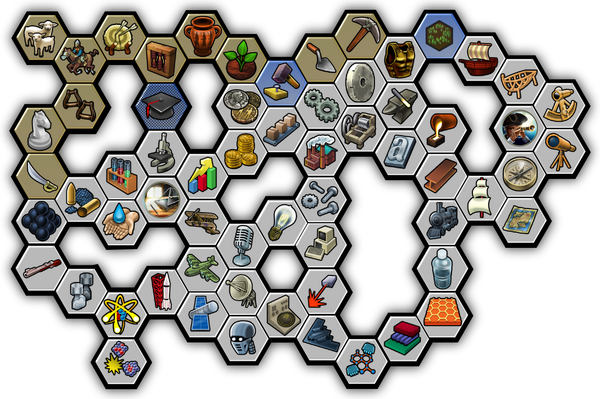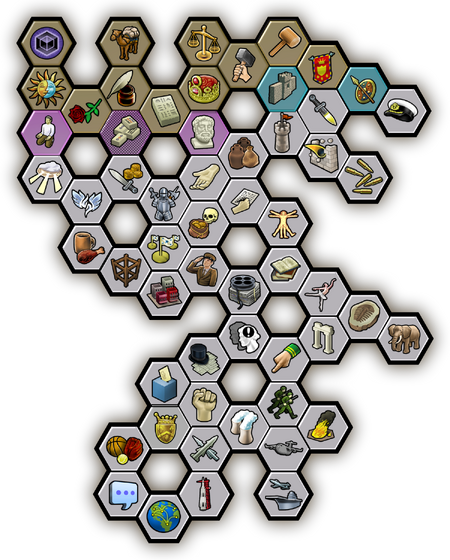I would love to have a CIV7 with regional groups of civs with different techs, eras, districs, units, etc. But is very unlikely to change on CIV series (like I dislike the leader focus). Maybe on a similar game.
This idea of different regional groups could even help to justify less eurocentrism, since most of the current on game "civs" are not true civilizations but very expecific nations/states/governments. Europe is basicaly one or two civilizations (west and east) in the make since late classical to medieval time, yes descentralized and with regional flavor, but is absurd to have on game two germanic protestant colonial nations that could be on design more different between them than any of them to a native american tribal civ or to a far east empire.
Make a group of Central Asia nomad civs with therir own eras, mechanics, units, etc. And then you could justify more civs that would use variations of that gameplay (Scythians, Huns, Turks, Mongols, etc.)
totally agree, and reflecting things like the fact that math and astronomy were first developed by India, Egypt and Babylon, then spreading elsewhere, being adopted and modified would be interesting (although the tech tree would have to be a bit more in depth). Likewise, Mongols and other central asians should have very early access to horseback riding. This would be like a more in-depth version of the civ 3/4 thing where certain civs started with certain techs.
This could also tie into regional/cultural abilities.
I was thinking more in the direction of EU4's Westernization mechanics. At a certain point your tribe needs to make the switch to the urbanized tech tree for survival and a chance to win a million dollars Civilization 7.
I don’t think this is a bad idea but they’d have to be careful about doing this with indigenous people civs. I’d also like paths to victory which allow indigenous nations to keep their cultural heritage over being forced to westernize for overwhelming bonuses, but that’s my take on this
A unique tech tree would be interesting for a Native American or Nomadic Civ. Maybe not exclusive to one Civilization, but a set of them.
Logistically, you could have an expansion of 8 non-urbanized civs from all around the globe (examples: Scythia, Mongols, Navajo, Taino, Zulu, Goths, idk, just some examples), and all eight of them share a separate tech (simplified) tree compared to the "urbanized" civilizations forgoing advanced sciences but gaining techs that improve their combat and yields. Making them less about settling and building, but more about making the most of the map, bargaining with neutral players such as Barbs and City States, and driving out the more "Civilized" entities from their lands.
I think that would be... quite fun, actually?
having nomadic tech trees could also actually make options like the ainu, saami and inuit make sense in the conceptualization of civ, as long as gameplay becomes more flexible to allow for hyper-wide play (tiny cities which are still productive and can be spaced closer together)
i can’t see nomadic civs working as long as districts take up an entire tile on the overlay. We’ve discussed this many times but reducing cities to one tile once again, but making adjacency bonuses something that happens on an internal level inside the city would be really interesting (you zoom in to place districts within the 1-tile city)
This also fixes map scale, bcs at present way too much land in relation to cities is urbanized and developed, which makes the map look covered in cities and wilderness is sparse. There’s also no way to make developing on rainforest or forest harder past the ancient era, when even to this day we can’t drive from North America to South America because certain parts of Northern Colombia are untraversable.
i hope tech exchange becomes something more broadly focused upon later. Right now it’s so mechanical...just espionage or trade. But why does having a neighbor study something not give you a bonus towards it (perhaps you actively learn that tech at a quarter of the rate? That would be cool)
I think in general Civ’s biggest issue is all of these aspects of humanity and cultural development are so surface level. Government just gives you a couple of different cards. Culture and Science are rigid trees. City lists are mutually exclusive. the religion you pick (named after a real one) doesn’t matter.
It would go so far (in terms of immersion) to actually flesh these things out. More government types and the one you choose gives you tangible advantages and disadvantages. Maybe even tie the exposure to a government by a great thinker (make people like Smith, Marx, Lenin, Plato, Aristotle, Locke, who developed new forms of government great people and by getting one that form of government arises in your land and you can choose to adopt it and it slowly spreads across the world and other places can adopt it).
The leader mechanism stops factional conflicts from ever being good, so i’ll ignore the idea of civil wars.
dynamic tech trees would be awesome for immersion.
city lists being exclusive and dynamic (if Byzantium founds Byzantium, Ottomans default to Edirne) would also increase immersion





